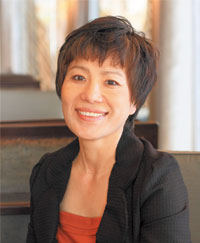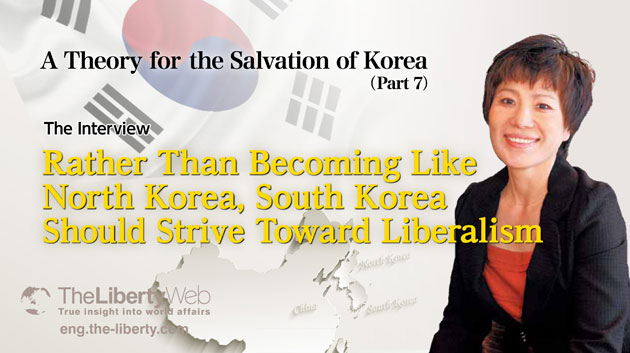A Theory for the Salvation of Korea (Part 7)
Interview with Professor Oh Seon-hwa: Rather Than Becoming Like North Korea, South Korea Should Strive Toward Liberalism
Interview with Professor Oh Seon-hwa
Rather Than Becoming Like North Korea, South Korea Should Strive Toward Liberalism.
Professor Oh Seon-hwa, Department of International Studies, Takushoku University

Professor Oh Seon-hwa was born in 1956 on Jeju Island, Korea. She came to Japan in 1983, and became an exchange student at Daito Bunka University (where she majored in English Studies). Afterwards, she completed a master’s program at Tokyo University’s School of Foreign Studies. She started her writing career while she was still in school. In recent years, she completed the naturalization process to become a Japanese citizen. Her major works include, “Why ‘There Is no Future in Anti-Japanese Korea'” (Shogakukan Shinsho), “Korea, Closed to Foreigners, Japan, Open Country” (Bunshun Bunko-Five time Winner of Yamamoto Nanataira Award), “The Wind of Skirts” (Sankosha), and numerous other works.
In fact, Korea should collaborate with liberal nations, but it has actually been becoming more like North Korea. North Korea was a nation that basically switched from a monarchy to a communist state, but it originally shared the same ethnicity as the South Koreans. South Korea has a common history, and it has more affinity with totalitarianism than with liberalism.
If you were to say anything pro-Japanese in today’s Korea, you would be destroyed socially. Last year, the country denied my entry on a recent trip, even though I was born in Korea. It was on account of my pro-Japanese activism. Not one person tried to speak out against the government or even attempted to defend me. Nothing appeared on the net either.
Korean media has been reporting whatever has been convenient for them and I don’t trust it. Korea’s historical education has recently suffered from a similar case. Its writers favor and defend the North Korean regime, while they circulate lots of damaging lies about Japan.
Korea has been teaching people that the Japanese exploited and massacred its citizens in the Annexation era, but when I checked the sources, I noticed that the population actually doubled in those 30 years. Rice production has become more than doubled as well. There was no doubt in my mind that rapid economic growth occurred throughout the Annexation era.
Moreover, Koreans haven’t really been informed of how Japan has repeatedly offered economic assistance in times such as after the war with agreements like the Japan-Korea Basic Treaty.
The Folly of Korea Courting China
Since Korea experienced its currency crisis in 1997, the country as a whole has apparently lost sight of its direction. I touched on this point in the beginning of the interview. It’s why Korea has been becoming more like North Korea, and it’s the reason why Koreans are currently courting the Chinese.
Korea was humiliated because the IMF had to supervise the government when it nearly collapsed economically. Since then, the gap between the rich and the poor has steadily widened, divorce rates have gone up, and crime has been on the rise, which has had a destabilizing effect on Korean society. Out of frustration, Koreans have become increasingly anti-Japanese and anti-American.
Since North Korea’s existence is basically based on anti-Japanese and anti-American propaganda, some people have thought that, “Perhaps North Korea is continuing the old traditions of the Korean Peninsula.” It was then that the former President Roh Moo-hyun, while carrying out an appeasement policy for North Korea, started to push for forceful anti-Japanese policies like the “pro-Japanese law” that confiscated assets from people who were actively pro-Japanese during the Annexation era. In the end, the president’s politics strongly tied together anti-Japanese feelings and pro-North Korean sentinements within his government policies.
In addition, China has been recently strengthening its national power, and it has started to appear as if it would become a major economic force that could exceed the standing of the United States. The Korean Peninsula has been prone to feel some affinity for nations like China that possess continental might. Koreans hope that they can gain the support of such grown-up-like countries to help put an end to North Korea’s belligerency. China might use Korea’s expectations, but when it comes down to reality, it will not help the Korean state. This belief is foolishness on the part of the Koreans.
Also, no matter how close the South Korean government feels like it has become to North Korea, it is still a country that executes people for watching pornography. South Korea cannot possibly unite with such a country.
“Repentance” Is Necessary
What Korea needs is the chance to ask for forgiveness. During the currency crisis, I felt that Korea finally had the chance to atone for its lack of power, but it did not lead to a deep repentance.
I grew up with a Korean education that was full of anti-Japanese sentiments, but after I studied in Japan, I began to question it. However, it was a great struggle to shed what I believed to be “common sense” up till that point in time, and to start appreciating Japan’s true nature. Korea, too, needs such a chance.
Korea and Japan have such different value systems that you can say that they are two different types of people. Yet, there is a feeling that they are somehow alike, and there might be a soft spot in the relationship. I believe that many problems actually arise from this soft spot. It would be good for both countries if a little distance existed between them.
The Korean government passed a decision to seek compensation against Nippon Steel and Mitsubishi Heavy Industries for damages during the war from descendents of the factory recruits. However, Mitsubishi Heavy Industries announced that it would refuse to cooperate. When given that attitude, Koreans actually had more respect for Japan.
Critical opinions against anti-Japanese diplomacy exist even from within Korea. Now is the moment Korea ought to throw away their anti-Japanese ideology, make a clean start, and seriously think about how they can learn from Japan.



















